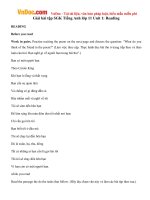Giải bài tập SGK Tiếng Anh lớp 12 Unit 4: Reading - Speaking
Bạn đang xem bản rút gọn của tài liệu. Xem và tải ngay bản đầy đủ của tài liệu tại đây (290.46 KB, 6 trang )
VnDoc - Tải tài liệu, văn bản pháp luật, biểu mẫu miễn phí
Giải bài tập SGK Tiếng Anh lớp 12 Unit 4: Reading - Speaking
Giải bài tập tiếng anh lớp 12 unit 4 sách giáo khoa trang 44
A. READING
❖ Before You Read
Read the facts below and decide whether the statements are true (T) or false (F). Then compare
your results with your partner’s. (Đọc những sự kiện dưới đây và sau đó quyết định những câu nói
đúng (T) hay sai (F), sau đó so sánh kết quả của em với kết quả của bạn cùng học.)
1. Children start Grade 1 when they are 6 years old.
2. Schooling is compulsory from the age of 6 to 16
3. The school year generally begins in September and ends in late May.
4. The students do not have any examinations when they finish secondary schoo
5. A school year consists of two terms.
Facts about schools
1. T
2.F
3. T
4.F
5.T
VnDoc - Tải tài liệu, văn bản pháp luật, biểu mẫu miễn phí
❖
While You Read
Read the passage and do the tasks that follow. (Đọc đoạn văn và làm bài tập kèm theo.)
Việc học ở trường có tính cưỡng bách đối với tất cả trẻ con ở Anh từ 5 đến 6 tuổi. Năm học ở Anh
kéo dài từ tháng Chín đến tháng Bảy và được chia làm ba học kì. Học kì mùa thu từ đầu tháng Chín
đến giữa tháng 12. Học kì mùa Xuân từ đầu tháng Giêng đến giữa tháng Ba và Học kì mùa Hạ từ đầu
tháng Tư đến giữa tháng Bảy. Mỗi học kì được phân chia bởi kì nghỉ một tuần gọi là giữa học kì.
thường thường vào cuối tháng Mười, giữa tháng Hai và cuối tháng Năm.
ở Anh có hai hệ thống trường song song nhau. Hệ thống thứ nhất là hệ thống trường công (nhà
nước), miễn phí cho tất cả trẻ con, và được nhà nưđc trà lương. Hệ thống thứ hai là hệ thống nhà
trường “độc lập” hay “công cộng”, phải trả tiền. Hệ thống trường công, giáo dục 93% học sinh nước
Anh, có thể được chia làm hai trình độ (cấp) giáo dục: giáo dục tiểu học và giáo dục trung học.
Xem bản bên dưới để thêm thông tin về hệ thống giáo dục nhà trường ở Anh.
Chương trình học quốc gia do chính phủ thiết lập và phải được tuân theo ở tất cả trườns công. Nó
được xây dựng với những môn học sau : tiếng Anh, Thiết kế & Kĩ thuật, Địa lí, Toán, Kĩ thuật thông
tin, Nhạc, Khoa học, Hội họa, Thể dục, Lịch sử và một ngoại ngữ hiện đại. Tiếng Anh, Toán và Khoa
học là những môn học chính, những môn bắt buộc ở các kì thi quốc gia ở giai đoạn đặc biệt của hệ
thống giáo dục nhà trường.
Hệ thống giáo dục nhà trường ở Anh
Trình độ giáo
dục
Tiển học đường
Lớp /Năm
Tuổi
Từ
Từ
đến
Môi
3-4
trường
chăm sóc
trẻ ở một
trường trẻ
con hoặc
4-5
đến
VnDoc - Tải tài liệu, văn bản pháp luật, biểu mẫu miễn phí
Tiểu học
Giáo dục tiểu
học
Giáo dục trung
học
1–3
5–7
4-6
8 – 10
7–9
11 – 14
10 - 11
14 – 16 (cuối
Chứng chỉ
giáo dục
trung học phổ
giáo dục
cưỡng bách)
thông
(GCSE)
Task 1: Find words or phrases in the reading passage which have the same following meanings.
(Tìm những từ hoặc cụm từ trong bài đọc có cùng những nghĩa sau.)
1. state school
3. secondary education
5. the General Certificate of Secondary Education
2. primary education
4. compulsory
6. curriculum
Task 2: Answer the questions. (Trả lời các câu hỏi)
1. They reach the age of 5.
2. There are three terms.
3.The two school systems in England are the state school system and the "independent" or
“ public” school system.
4. Yes, they do.
5. There are three core subjects in the national curriculum: English, Maths and Science.
6. When they finish the secondary schools, they have 10 take an examination called the General
Certificate of Secondary Education. (GCSE)
❖
After You Read
VnDoc - Tải tài liệu, văn bản pháp luật, biểu mẫu miễn phí
Work in groups. Tell the others one of the most difficult school subjects you are studying and what
you would like your friends and your teacher to dc to help you learn that subject more
effectively. (Làm việc từng nhóm. Kể cho các bạn khác một trong những môn học khó nhất ở trường
em đang học và những gì em muốn các bạn em và giáo viên của em làm để giúp em học môn đó hữu
hiệu hơn.)
A. Is there any subject you find the most difficult?
B. Yes, it's English.
C. What do you find difficult about it?
B. Its pronunciation. Most of my friends do think so.
C. Do you ask your teacher to help you?
B. Why not? But after a lot of practices I still find I cannot pronounce and read the words correctly.
A. Well, from my experience, in order to speak English well and correctly we should be patient
and constant. It takes a lot of time and patience. You read a word or a sentence many times until you
find it good enough.
C. And you should study with your friends to help one another in speaking. If possible, you can ask
your teacher to correct you when you find you‘re run good or not confident in yourself.
A. You will speak more easily and better if you're patient and practise frequently.
B. SPEAKING
Task 1: Work ill pairs. Study the table below then ask and answer the questions about the school
education system in Vietnam.( làm việc từng đôi. Nghiên cứu bản dưới đây và sau đó hỏi và trả lời
những câu hỏi về hệ thống giáo dục ở nhà trường ở Việt Nam.
A. When do small children in Vietnam go to nurseries?
B. Usually at the age of 3.
A. How long is the pre-school stage ?
B. In principle 3 years, but it depends.
VnDoc - Tải tài liệu, văn bản pháp luật, biểu mẫu miễn phí
A. You mean it's according to the child’s ability?
B. Right.
A. When do children start the primary education?
B. At the age of 6.
A. Well. Can children start their primary education before 6 if they have enough capacity? I mean
they can read and write even at the age of five.
B. I’m afraid they cannot, in principle.
A. Oh! What's I he level of education after the primary education?
B. It's the Secondary education. And this level is divided into two stages: lower and upper
secondary schools.
A. Is there any exam between these two stages?
B. Yes. To enter the upper secondary schools, students must lake the recruitment exam.
A. How long is normally the secondary education?
B. Seven years.
A. At the end of the upper secondary education do students have to take any exams?
B. Sure. They must take an exam called "Tu Tai" Diploma.
A. I see. One more question. Must students pay tuition fee for their study in state schools?
B. Certainly they must. They must pay tuition fee for every stage of education and some additional
fees.
A. Oh, really? Thank you for your answers.
B. My pleasure.
Task 2: Work in groups. Talk about the similarities and differences between the school system In
Vietnam and that in England. (Làm việc từng nhóm. Nói về sự tương đồng và khác biệt giữa hệ thống
trường học ở Việt Nam và hệ thống trường học ở Anh.)
VnDoc - Tải tài liệu, văn bản pháp luật, biểu mẫu miễn phí
A. I’m not sure, but I think there are certain similarities and differences between the school system
in Vietnam and that in England.
B. I think so, loo. But what differences do you know?
C. As I know, first both systems have the same three levels of education, and the starting age of
schooling.
D. But in England, as I know, there isn’t such a strict and unreasonable rule of starling age of
schooling.
A. What do you mean?
D. OK. As I'm told, in England a pupil can attend a class if he or she has enough capacity as
required.
B. About the differences I see there are a lot.
C. For example?
B. The academic year. In Vietnam there are only two periods of schooling in a year, each of which
lasts about five months or so.
A. I see. In England an academic year is divided into three by season.
D. And one more difference: in England students needn’t take any exam to enter the upper
secondary schools.
C. But we should not ignore the most major difference: the tuition fee for nursery, primary and
secondary educations. For these three levels, people do not pay any tuition in England. I mean they
are totally free and compulsory.
B. Oh, really?









